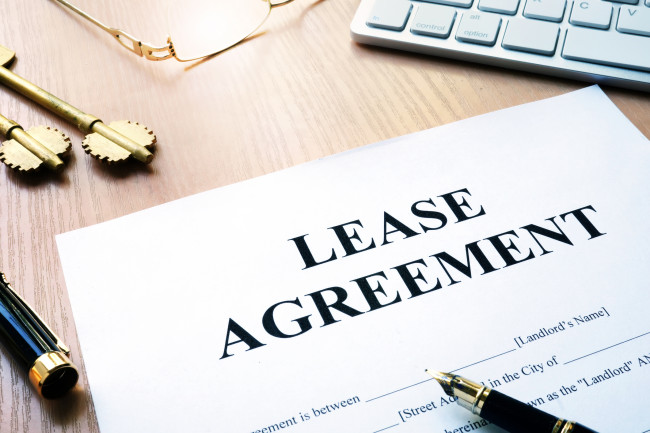Signing on as a guarantor? Protect yourself!

The role of guarantor is not for everyone—you’ll need to make at least 80 times a NYC renter’s monthly rent, which you’re on the hook for if they default.
iStock
It's spring, which means lots of New York City renters are going to be hunting for a new apartment and signing leases. If, that is, they meet a landlord’s income requirements, which in NYC typically means a renter’s yearly salary must be at least 40 to 50 times the monthly rent. If it isn’t, he or she may need a guarantor in order to get the apartment.
But the role of guarantor is not for everyone as you’ll need to make at least 80 times the monthly rent—and are legally responsible for the rent if a tenant defaults. Not surprisingly, financially stable parents or close relatives are usually the only people willing to sign on as guarantors.
If you're considering being a guarantor for a NYC renter, here are four things to keep in mind, plus some information on the option of using an institutional guarantor.
[Editor’s note: A previous version of this post was published in February 2017. It has been updated with new information in May 2019.]
1. You're responsible for the entire rent
Many landlords only allow one guarantor per lease, so if you agree to be the guarantor for your kid or another relative, you’re guaranteeing the rent for the entire apartment—and yes, that includes any roommates, too.
This leaves you two options: Get comfortable with the risk, or consider an institutional guarantor.
For a fee of about 70 to 90 percent of one month’s rent for U.S. citizens and 95 to 110 percent for foreign nationals, Insurent Lease Guaranty, a Brick Underground sponsor, can act as a guarantor. International students pay a little less than one month’s rent, says Jeffrey Geller, vice chairman and chief operating officer.
Insurent currently guarantees more than 450,000 rental units in thousands of NYC buildings for college and professional graduates entering the workforce who don’t meet landlords’ income requirements, and foreign executives relocating to the U.S. who have no U.S. credit history. It also covers relocating U.S. executives, those who are self-employed, and non-employed foreign and U.S. renters with significant cash liquid assets, as well as international and U.S. students and corporations. (Note: Insurent won’t back renters with bad credit.)
These days, it makes economic sense to have a roommate. At least 30 percent of Insurent’s applications are for apartments shared by students, unmarried partners, or friends, Geller adds, noting that the number of applicants who have roommates has risen steadily in recent years, tracking with a rise in NYC rents.
Want a landlord that will accept guarantors from more than one roommate? The rental experts at The Agency, a Brick Underground partner, can save you time, risk, and money. Sign up here to take advantage of The Agency's corporate relocation rate--where you'll pay a broker's fee of 10 percent of a year's rent on open listings instead of the usual 12 to 15 percent. Bonus: The agents at The Agency are a delight to deal with.
If the landlord accepts multiple guarantors, you still need to take some steps to protect yourself legally. It may be in your best interest to have a lawyer draw up a contract amongst the guarantors so no individual is left on the hook if any (or all) of the renters default.
Takk Yamaguchi, a real estate agent at Compass, also recommends having a separate agreement between guarantors.
“The agreement should identify what steps are needed to be taken in the event one or two roommates default on the lease," he says. Scenarios include “failure to pay rent, give possession upon lease expiration, and breaking of house rules. If the matter is taken to housing court, it can go on the guarantor's housing record, and if assigned to collections, then the file will be recorded on their credit report.”
2. Don't guarantee just anyone
One big risk is guaranteeing the lease for somebody you don’t know as well as you should, says Cecil Weeks, a former longtime NYC real estate agent who is now based in Houston.
"Do not guarantee leases for mere acquaintances or co-workers. Only guarantee leases for responsible family members and very close friends,” he urges. “Find out if the landlord will use your supporting documents to verify income qualification or to prop up an applicant with poor credit. Unless aiding the application of a child/college student, avoid guaranteeing applicants whose income falls too far short of what is required or whom have very poor credit unless you're aware of unfortunate/unavoidable circumstances.”
3. An open dialogue with a landlord is a must
Guarantors may find out too late that tenants aren’t paying rent on time, especially in a roommate situation, says Adjina Dekidjiev, rental manager at Citi Habitats. Sometimes a guarantor only learns of a bad situation once it becomes irreparable.
“Guarantees usually stipulate that the guarantor waives notices of default,” she says. In order to stay on top of things, “the guarantor should insist that the landlord notifies him or her if rent payments are late.”
It's not likely you will be able to change the terms, but Dekidjiev says if you make a personal request of the landlord, they may send you notices as a matter of courtesy. In some cases, they might allow you to co-sign the lease as a “co-signer” instead of “guarantor,” therefore ensuring that you’ll receive notification, she adds. (What’s the difference? A co-signer is a co-tenant who is on the lease, which means they have a legal right to live in the apartment, whereas a guarantor takes on all the financial risk of an apartment’s rent but isn’t legally entitled to occupy it.)
This could allow you, as a guarantor, the opportunity to find out if the leaseholder is in financial trouble and will continue to miss payments, or if it was a one-time occurrence. It could mean the difference between helping out with the monthly rent or facing a mountain of missed payments.
"In the case of roommates, if roommates are not paying, the guarantor can call the other tenant's parents—or guarantors—to remind them of their obligations," Dekidjiev says.
4. Set clear time limits
All lease guarantees have clauses that address lease renewals, extensions, and modifications. Some clauses may be more "guarantor friendly" than others.
Do your research about whether or not you can renegotiate the lease to get out of the guarantee if the leaseholder's financial situation improves or you come up against your own financial hardships. Again, you will probably not be able to change the guaranty agreement, so make sure you're comfortable with what the lease says.
You Might Also Like

























